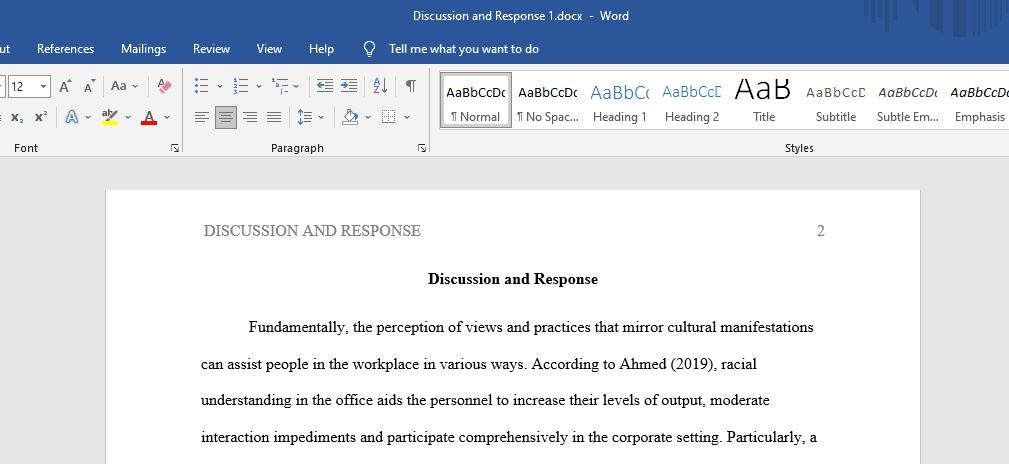Discussion and Response-Culture and Critical Thinking
To make the most out of your learning experience and earn a good Discussion grade, you must answer the Discussion question and then respond substantially to at least two classmates’ postings for each unit Discussion. You should write at least 200 words in the original post; then you should post with content and detail on the posts to your peers. Aim for at least four sentences in each post to your peers, building the Discussion with references to the Reading, application in your life, or other information to help share your perspective. With the original reply and two posts to your peers, this means you will post three times to each Discussion Board. You will want to use APA format with in-text and full end reference for citation of sources, which can help to give credit to the research you used and also to distinguish between your ideas and the sources.
Topic 1: Culture and Critical Thinking
How can an understanding of beliefs and customs that reflect cultural expressions help you in the workplace? Consider a career you are pursuing or a position that you have held in the past. What is a specific task required of that job? Explain how an understanding of culture could help you to manage the challenges and opportunities of that task.
Next, discuss how an understanding of culture can make you a stronger critical thinker. When might this be useful for managing a task you have in your daily life?
Hannah Serra posted Dec 16, 2020 10:42 AM
This page automatically marks posts as read as you scroll.
Adjust automatic marking as read setting
Our world is extremely culturally diverse. Cultural expressions allow us to gain a new perspective on the world. Everyone is raised with their own norms, beliefs, even traditions. For this reason, it is beneficial to be understanding of these differences in the workplace. I work in the medical field as an X-ray technician. I see a vast amount of patients of different size, color, gender, the list goes on. From the moment I check a patient in, I am trying to provide the best medical care possible. This means making the patient as comfortable as possible. To help you better understand how important this is, I’ll share some brief examples. One of my male coworkers had a patient, an older Indian woman. She explained that it was against her and her husband’s beliefs for her to be alone in a room with another man. I took over and ended up shooting her x-rays, it was as simple as that. On another occasion, I went to call a patient from the waiting room. On the order it said that the patient was male, so I called them Sir. The patient explained that they do not identify as male anymore, and kindly asked for me to use she/her pronouns. Working in medical care comes with many challenges. Not letting these challenges affect the workplace allow us to overcome these obstacles and complete the task at hand.
Critical thinking can be defined as thinking clearly, making logical connections between ideas. This skill could be useful in anyone’s day to day life. When you interact with people, think before you speak.
-Hannah
Hello Class and Prof,
I cannot believe that this our last discussion. This has been a fun course with you all.
Understanding cultural expressions such as beliefs and customs in the workplace can help because it makes it easier to work with others of diverse cultures. In my future career being a BCBA, I could have clients of various cultures and would need to communicate with them respectfully and professionally. I would want to know about their culture so I would not offend them and be respectful of them instead. I could get more opportunities from that if they send their family and friends to my workplace since I was accommodating and respectful to their culture.
An understanding of culture can make me a stronger critical thinker because it helps people to react quickly and act appropriately in culturally diverse settings. It also allows for analyzing various points of view and distinguishes between subjective reaction and reasoning. Since critical thinking incorporates creativity, that goes hand in hand with culture since it is a creative expression. Intercultural competence often parallels critical thinking development (Sobkowiak, 2016). This would be useful in my everyday life when I talk to people of a different culture and help my daughter to also be a cultural critical thinker as well. She is five and we have already taught her to be open-minded towards others.
Great class with you all,
Kathy
Reference
Sobkowiak, P. (2016). Critical Thinking in the Intercultural Context: Investigating EFL Textbooks. Studies in Second Language Learning and Teaching, 6(4), 697–716. https://search.ebscohost.com/login.aspx?direct=true&db=eric&AN=EJ1134499&site=eds-live.
Requirements: .doc file
Answer preview:

word limit:527
